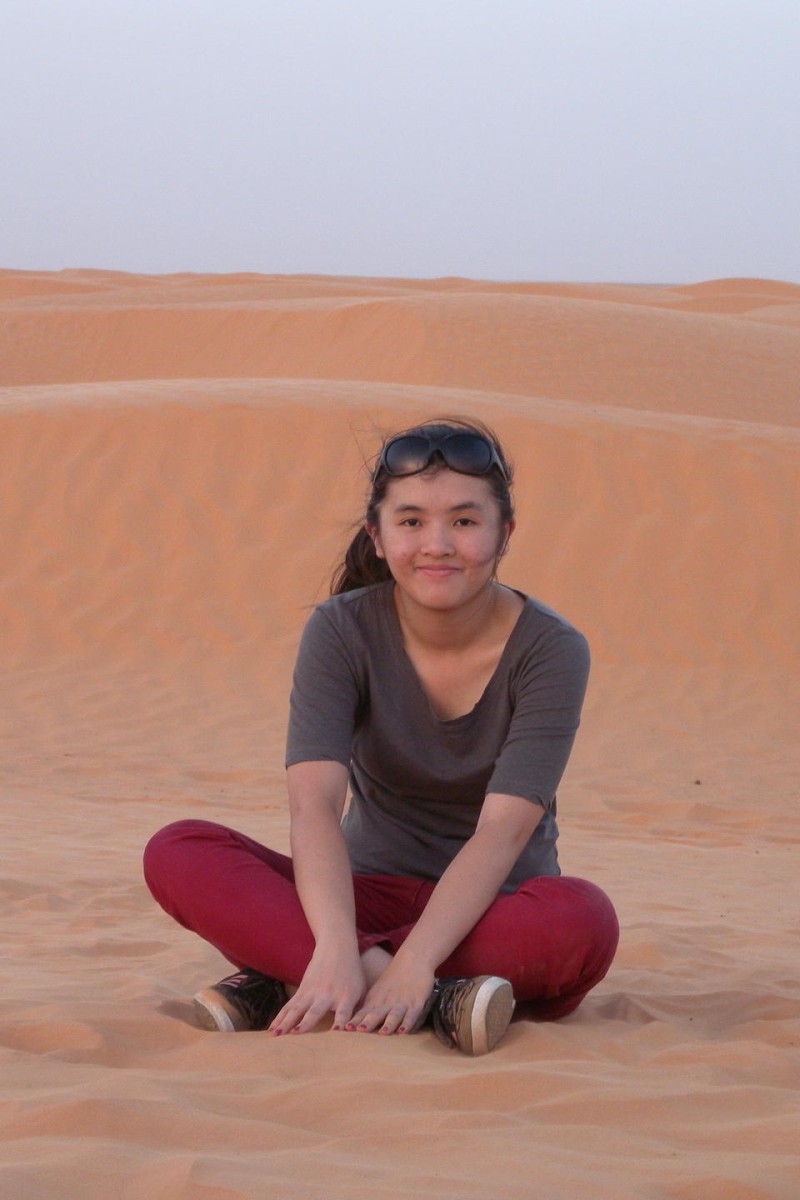
As student Joey Ma swapped Hong Kong for Tunisia, a Tunisian student, Azmi Lajnef, ventured to explore Shenzhen. They both learned that adapting to a new culture is hard
 AIESEC exchange participant Joey Ma gets used to the sand during her stay in Tunisia.
AIESEC exchange participant Joey Ma gets used to the sand during her stay in Tunisia.Living a new life
Thanks to an opportunity provided by AIESEC HKU, Joey Ma discovered an ideal community project in Tunisia and set her sails to the North African country during the summer of 2014.
Ramadan is the month when Muslims are required to fast during the day. Even non-Muslims observe the holiness of Ramadan in Muslim countries. No one should eat or drink in public areas. Almost all cafes and restaurants are closed during the day. Besides catering, other businesses are also affected; during this period, most shops, including banks, are closed in the afternoon. The streets become unbelievably quiet.
Along with other interns, I did some work for charities in the morning. After work, there was no entertainment available at all. We would take naps and idle away the afternoon. But when dusk came, everyone became active again. As the call for prayer was heard, Tunisians would join their families to break the fast with a much-anticipated Ramadan dinner. Words can't possibly describe how excited we were for the cafes and restaurants to open every evening; for dinner, and also for Wi-fi! We all became night owls that month.
I still remember how frustrated I was at the beginning. Even withdrawing money from the bank became impossible during "normal business hours". One time I ran out of Tunisian currency, but the banks were all closed after work. The only option was to be excused from work to go to the bank. Fortunately, my employer was very understanding.
Life during Ramadan may sound difficult. But once you get used to the routine, it's not that hard. Ramadan is also a period where you are given the opportunity to bridge cultural differences, as you gain first-hand knowledge and experience of a culture that is completely different to that of Hong Kong. I think this is better than "experiencing" Islamic culture through a documentary or an article because you are more than an observant viewer; you learn the culture through living in it.
Joey Ma
Adapt and embrace
Through AIESEC HKU's Global Internship Programme, Azmi Lajnef, a Tunisian university graduate, worked in a Chinese automotive design company for three months as a market research intern 6,000km miles from home, in Shenzhen.
While others were excited for their exchange trips, I felt underwhelmed by and fearful of what I was about to embark on. The term "market research" did not even come across my mind when I was first looking for opportunities to work abroad, let alone taking up an internship that was not within my field of competencies while working in an entirely new and distant culture.
Particularly, I was challenged by the cultural difference in engaging with new friends and colleagues. It was not easy in the beginning. While I appreciate many of my new friends tried their best to make me feel at home, I found it puzzling that they kept a respectful distance soon after, shying away from conversing in English.
Frank exchanges are vital to build a solid and honest friendship, especially in China, where I found that trust, friendships and patience are also essential to professional relationships. Because of the distance between myself and everyone around me, I felt a little bit lonely at times.
Yet these obstacles did not discourage me. In Arabian culture, we spend long hours with friends in cafes. But in Shenzhen, people tend to spend time together in parks, shopping malls and cinemas. Indeed, the environment is very different from that in Tunisia, but we are essentially the same! As long as you are willing to engage and seize opportunities to learn, it is possible to build friendships despite the language barriers.
At the start of my internship, I maintained a professional, yet distant relationship with a colleague of mine, Linda. But gradually, as I realised that I had to reach out, I took the opportunity to ask her questions at work and a genuine friendship developed between us.
Eventually, I got to meet her husband and family members around Shenzhen. Knowing that I was a bit lonely, they took me sightseeing and to visit their friends in the city. What surprised me the most was how willing they were to invite a stranger to try traditional Chinese home-cooking, and insisted that I should taste everything on the table. The experience left me with a wonderful impression of Chinese culture and hospitality.
It was difficult at the start of my journey in Shenzhen. But after experiencing so many new things, I was able to immerse myself in a foreign culture and environment. For that, I must say, thank you, China!
Azmi Lajnef
About AIESEC
AIESEC is the world's largest global and youth-led network for young people to explore and develop their leadership potential, creating positive impact through personal development and shared global experiences. We are a non-political, independent, not-for-profit organisation run by students and recent graduates of institutions of higher education. Its members are passionate about world issues, leadership development, cultural understanding and experiential learning.